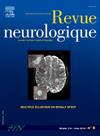2021/2022 年视盘水肿的流行病学:197 例患者的研究结果。
IF 2.8
4区 医学
Q2 CLINICAL NEUROLOGY
引用次数: 0
摘要
研究目的我们的研究旨在确定 2021 年至 2022 年间视盘水肿的病因:这是在马赛的蒂莫内和诺德大学医院进行的一项多中心研究。眼科部门对患者进行了回顾性随访,纳入时间为 2021 年 1 月至 2022 年 12 月。所有新确诊的单侧或双侧视盘水肿患者(包括成人和儿童)均被纳入研究范围。眼科评估包括眼底检查和光学相干断层扫描(如可行):结果:共纳入 197 名患者。颅内高压(IH)是最常见的病因(37.06%)。IH的主要病因是特发性(27/73)、颅内肿瘤(21/73)和脑静脉血栓(12/73)。视盘水肿的第二个病因是视网膜静脉闭塞,占 19.9%(39/197)。葡萄膜炎反应性水肿占 13.2%(26/197)。最后,还发现了炎症性(17/197)和缺血性(30/197)视神经病变:本研究更新了 2021 年和 2022 年最常见的视盘水肿病因,有助于对新发视盘水肿提出诊断假设。它强调了结合成像技术和生物标志物的最新进展,在诊断视盘水肿时进行全面和个性化评估的重要性。本文章由计算机程序翻译,如有差异,请以英文原文为准。
Epidemiology of optic disc edema in 2021/2022: Results from a cohort of 197 patients
Objective
The aim of our study was to determine the etiologies of optic disc edema between 2021 and 2022.
Materials and methods
This was a multicentric study at the Timone and Nord university hospitals in Marseille. Patients were retrospectively followed in ophthalmology departments, with inclusion between January 2021 and December 2022. All patients presenting with newly diagnosed uni- or bilateral optic disc edema, both adults and children, were included. Their ophthalmological evaluation included a fundus examination and optical coherence tomography if feasible.
Results
In total, 197 patients were included. Intracranial hypertension (IH) was the most frequent etiology (37.06%). The primary causes of IH were idiopathic (27/73), intracranial tumors (21/73), and cerebral venous thrombosis (12/73). The second etiology of optic disc edema was retinal vein occlusion in 19.9% of cases (39/197). Edema reactive to uveitis was found in 13.2% of cases (26/197). Finally, inflammatory (17/197) and ischemic (30/197) optic neuropathies were identified.
Conclusion
This study updates the most frequent etiologies of optic disc edema in 2021 and 2022 to facilitate diagnostic hypotheses for de novo optic disc edema. It highlights the importance of a comprehensive and personalized evaluation in diagnosing optic disc edema, taking into account recent advances in imaging techniques and biomarkers.
求助全文
通过发布文献求助,成功后即可免费获取论文全文。
去求助
来源期刊

Revue neurologique
医学-临床神经学
CiteScore
4.80
自引率
0.00%
发文量
598
审稿时长
55 days
期刊介绍:
The first issue of the Revue Neurologique, featuring an original article by Jean-Martin Charcot, was published on February 28th, 1893. Six years later, the French Society of Neurology (SFN) adopted this journal as its official publication in the year of its foundation, 1899.
The Revue Neurologique was published throughout the 20th century without interruption and is indexed in all international databases (including Current Contents, Pubmed, Scopus). Ten annual issues provide original peer-reviewed clinical and research articles, and review articles giving up-to-date insights in all areas of neurology. The Revue Neurologique also publishes guidelines and recommendations.
The Revue Neurologique publishes original articles, brief reports, general reviews, editorials, and letters to the editor as well as correspondence concerning articles previously published in the journal in the correspondence column.
 求助内容:
求助内容: 应助结果提醒方式:
应助结果提醒方式:


